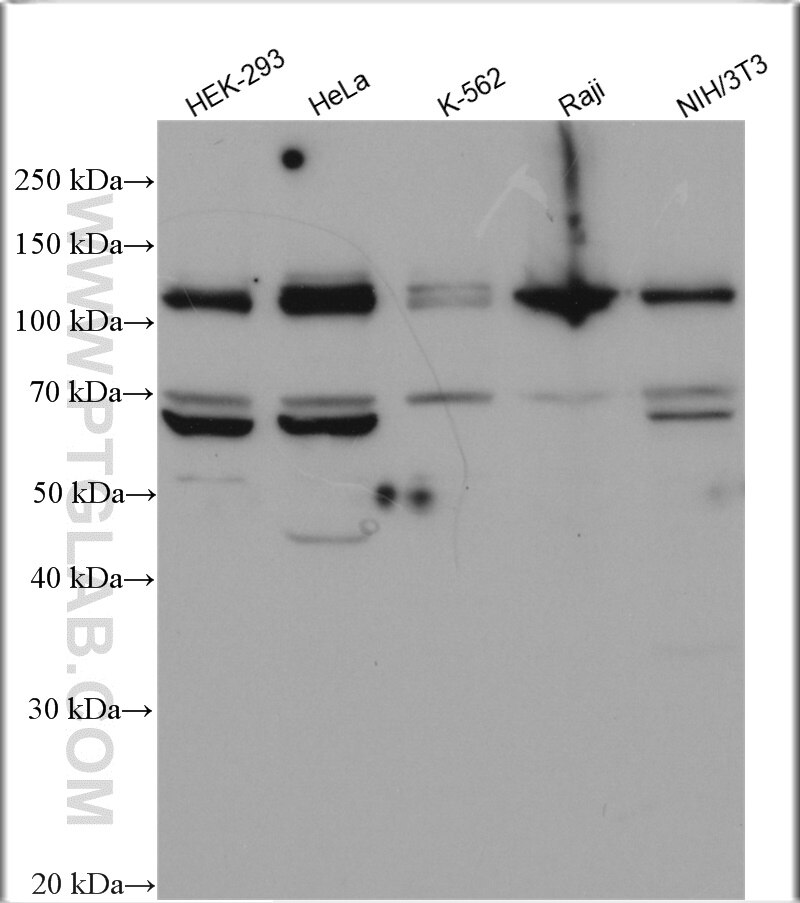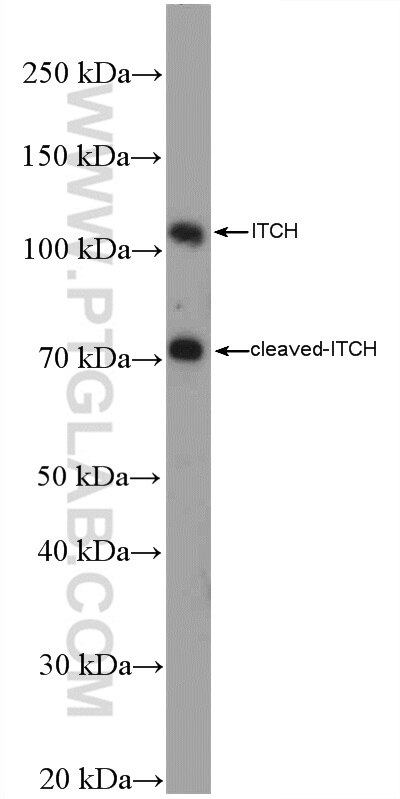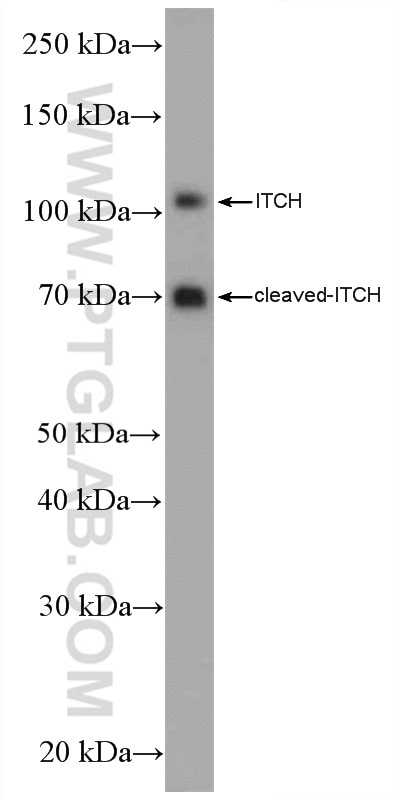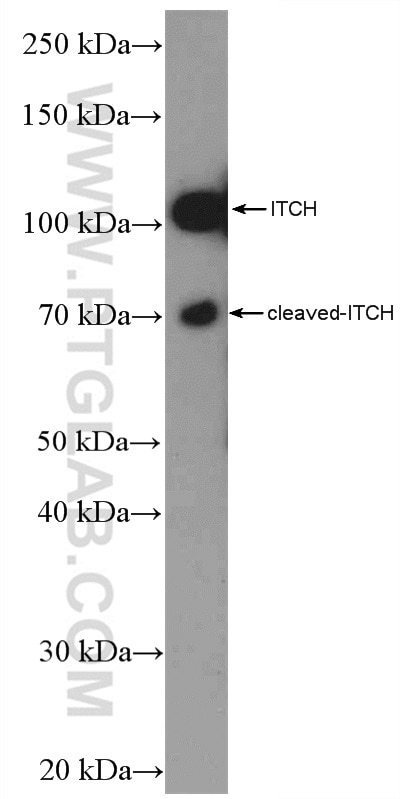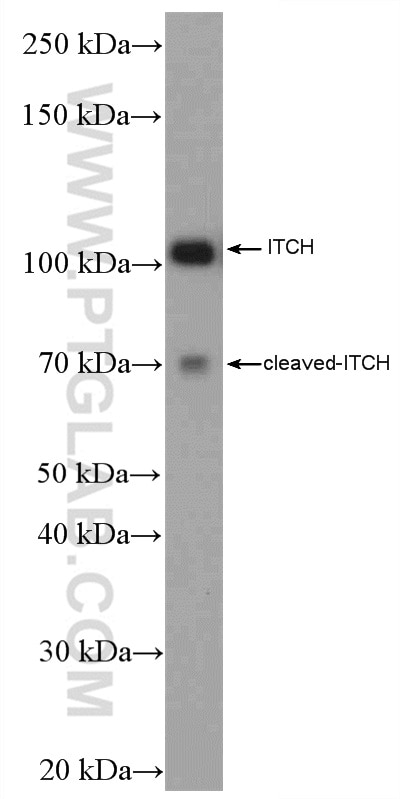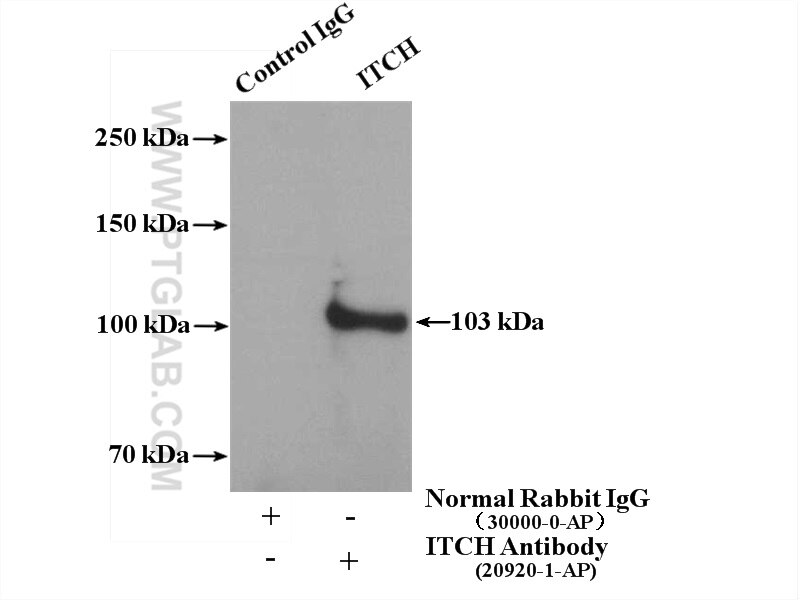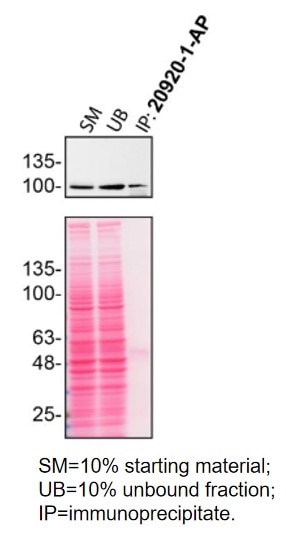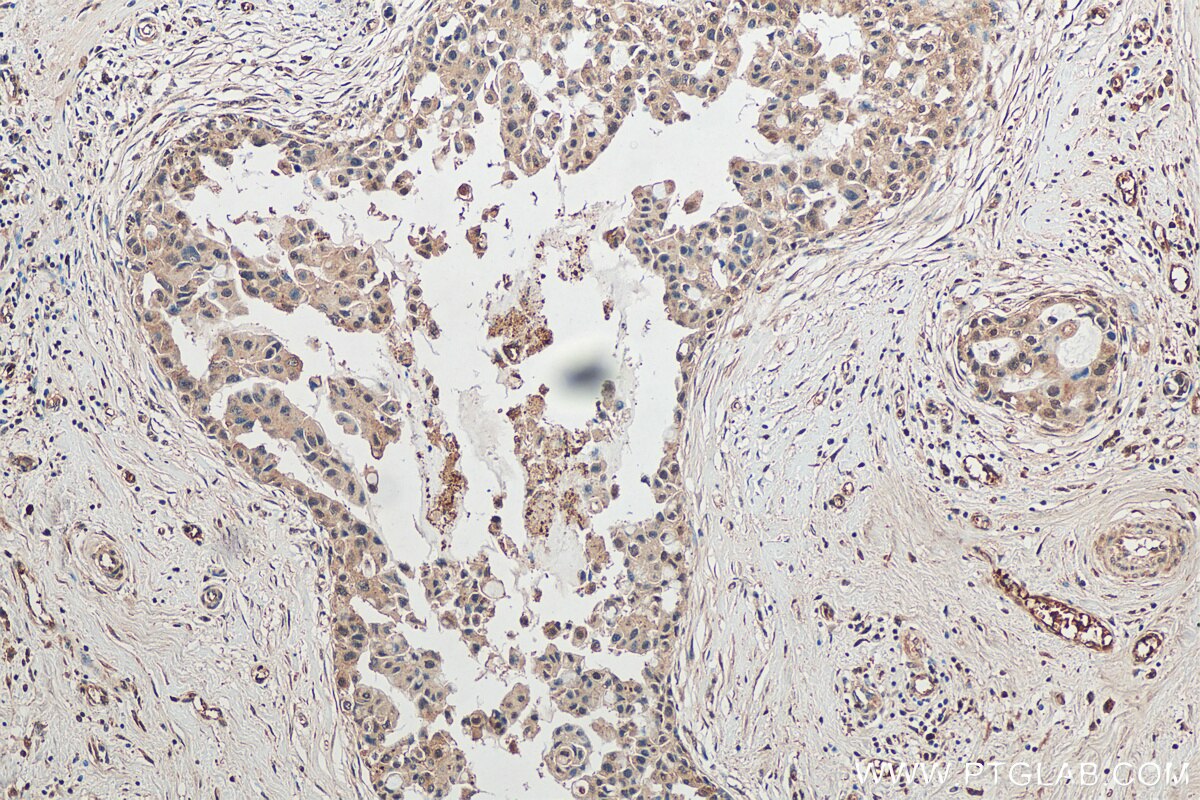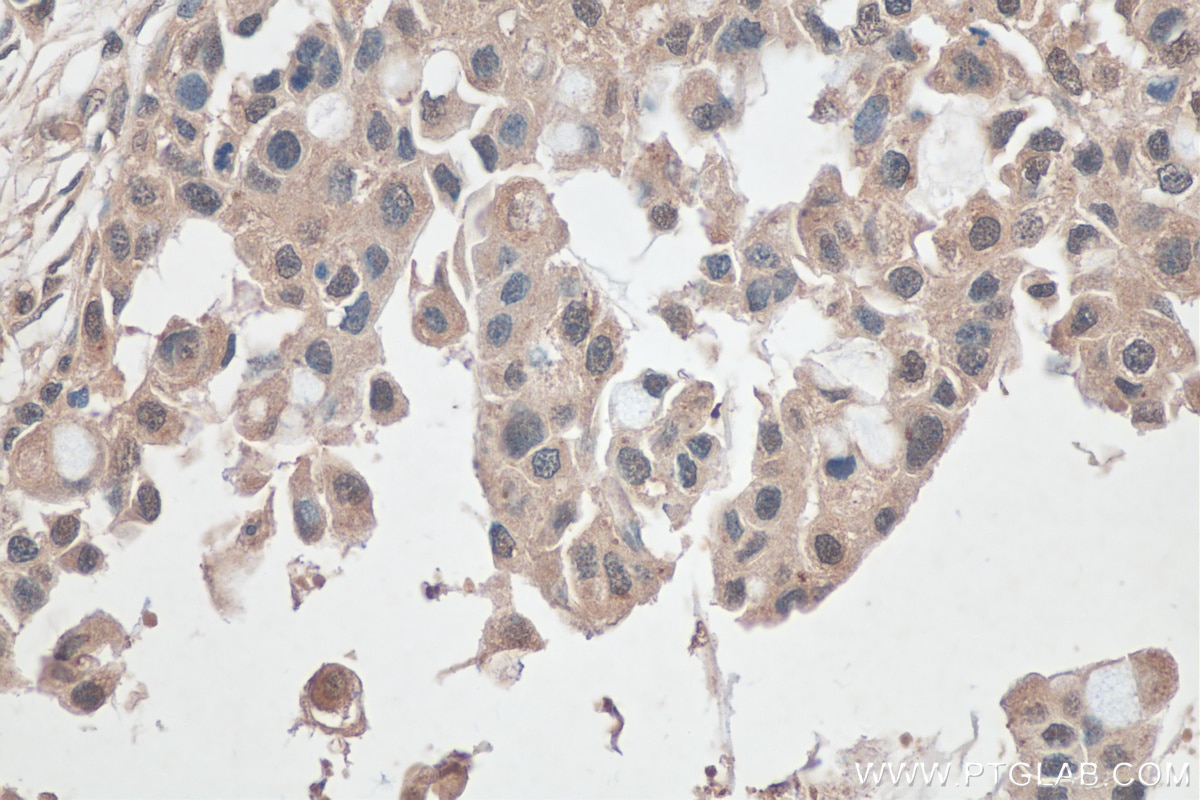- Phare
- Validé par KD/KO
Anticorps Polyclonal de lapin anti-ITCH
ITCH Polyclonal Antibody for WB, IHC, IP, ELISA
Hôte / Isotype
Lapin / IgG
Réactivité testée
Humain, souris et plus (1)
Applications
WB, IHC, IP, CoIP, ELISA
Conjugaison
Non conjugué
N° de cat : 20920-1-AP
Synonymes
Galerie de données de validation
Applications testées
| Résultats positifs en WB | cellules HEK-293, cellules HeLa, cellules K-562, cellules NIH/3T3, cellules Raji, cellules U-251 |
| Résultats positifs en IP | cellules HEK-293, cellules HeLa |
| Résultats positifs en IHC | tissu de cancer du sein humain, il est suggéré de démasquer l'antigène avec un tampon de TE buffer pH 9.0; (*) À défaut, 'le démasquage de l'antigène peut être 'effectué avec un tampon citrate pH 6,0. |
Dilution recommandée
| Application | Dilution |
|---|---|
| Western Blot (WB) | WB : 1:1000-1:4000 |
| Immunoprécipitation (IP) | IP : 0.5-4.0 ug for 1.0-3.0 mg of total protein lysate |
| Immunohistochimie (IHC) | IHC : 1:50-1:500 |
| It is recommended that this reagent should be titrated in each testing system to obtain optimal results. | |
| Sample-dependent, check data in validation data gallery | |
Applications publiées
| KD/KO | See 5 publications below |
| WB | See 16 publications below |
| IHC | See 2 publications below |
| IP | See 2 publications below |
| CoIP | See 3 publications below |
Informations sur le produit
20920-1-AP cible ITCH dans les applications de WB, IHC, IP, CoIP, ELISA et montre une réactivité avec des échantillons Humain, souris
| Réactivité | Humain, souris |
| Réactivité citée | rat, Humain, souris |
| Hôte / Isotype | Lapin / IgG |
| Clonalité | Polyclonal |
| Type | Anticorps |
| Immunogène | ITCH Protéine recombinante Ag15120 |
| Nom complet | itchy E3 ubiquitin protein ligase homolog (mouse) |
| Masse moléculaire calculée | 903 aa, 103 kDa |
| Poids moléculaire observé | 103 kDa, 70 kDa |
| Numéro d’acquisition GenBank | BC011571 |
| Symbole du gène | ITCH |
| Identification du gène (NCBI) | 83737 |
| Conjugaison | Non conjugué |
| Forme | Liquide |
| Méthode de purification | Purification par affinité contre l'antigène |
| Tampon de stockage | PBS with 0.02% sodium azide and 50% glycerol |
| Conditions de stockage | Stocker à -20°C. Stable pendant un an après l'expédition. L'aliquotage n'est pas nécessaire pour le stockage à -20oC Les 20ul contiennent 0,1% de BSA. |
Informations générales
ITCH is an essential component of a ubiquitin-editing protein complex, comprising also TNFAIP3, TAX1BP1 and RNF11, that ensures the transient nature of inflammatory signaling pathways. It is involved in the regulation of apoptosis and reactive oxygen species levels through the ubiquitination and proteasomal degradation of TXNIP. ITCH can be cleaved by caspase-3, -6, and -7 on residue Asp240 and form a 65 kDa cleaved form (PMID: 19541840).
Protocole
| Product Specific Protocols | |
|---|---|
| WB protocol for ITCH antibody 20920-1-AP | Download protocol |
| IHC protocol for ITCH antibody 20920-1-AP | Download protocol |
| IP protocol for ITCH antibody 20920-1-AP | Download protocol |
| Standard Protocols | |
|---|---|
| Click here to view our Standard Protocols |
Publications
| Species | Application | Title |
|---|---|---|
Nat Cell Biol Heat stress activates YAP/TAZ to induce the heat shock transcriptome.
| ||
Dev Cell ASK1-Mediated Phosphorylation Blocks HDAC6 Ubiquitination and Degradation to Drive the Disassembly of Photoreceptor Connecting Cilia.
| ||
Theranostics ACSS3 represses prostate cancer progression through downregulating lipid droplet-associated protein PLIN3. | ||
Clin Transl Med GRAMD4 inhibits tumour metastasis by recruiting the E3 ligase ITCH to target TAK1 for degradation in hepatocellular carcinoma.
| ||
Front Oncol Coiled-Coil Domain-Containing 68 Downregulation Promotes Colorectal Cancer Cell Growth by Inhibiting ITCH-Mediated CDK4 Degradation.
| ||
J Mol Med (Berl) Hyper-SUMOylation of SMN induced by SENP2 deficiency decreases its stability and leads to spinal muscular atrophy-like pathology. |
Avis
The reviews below have been submitted by verified Proteintech customers who received an incentive for providing their feedback.
FH Chrisovalantou (Verified Customer) (10-31-2024) | Antibody was able to detech endogenous ITCH in SH-SY5Y and HEK293T on western blot
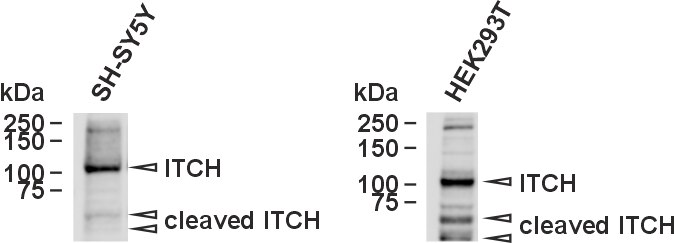 |
